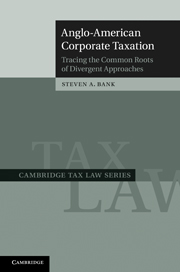Introduction
Published online by Cambridge University Press: 07 October 2011
Summary
Over the last century, countries have typically followed either the United States model or the United Kingdom model in taxing corporate income. In the USA, corporations are subject to tax as separate entities under what is called the classical system. Income is taxed first to the corporation when earned and a second time to the shareholders when distributed as a dividend. This double taxation was mitigated to some extent in the USA by a 2003 reduction in the rate applied to the shareholder-level tax on certain dividend payments, but it left the basic double tax system intact. The UK system of corporate taxation has traditionally stood in sharp contrast to the US approach by integrating the corporate income tax with the taxation of shareholders. Although this integration could be effected through a variety of means, including a corporate deduction for dividends paid or a shareholder exemption for dividends received, the UK has historically integrated the corporate and individual income taxes through an imputation approach in which shareholders are provided a credit designed to offset at least a portion of the tax paid on that income at the company level. The amount of that credit has declined in recent years, but the UK has retained at least a hybrid approach to corporate income taxation.
This sharp divide between the US and UK approaches has not always existed. When income taxation was employed during the nineteenth century, both countries taxed corporate income in a system that was integrated with the individual income tax. It was only around World War I that the nations began to diverge as the USA moved to a classical system while the UK retained a largely integrated approach. Moreover, there have been several instances during the last century when the countries moved closer together, including most notably during the last decade or so. This book seeks to explore the history of British and American corporate income taxation in search of the factors that may help explain why they diverged and converged over the years and what this portends for the future of corporate income taxation in the two countries and around the globe.
- Type
- Chapter
- Information
- Anglo-American Corporate TaxationTracing the Common Roots of Divergent Approaches, pp. 1 - 18Publisher: Cambridge University PressPrint publication year: 2011

